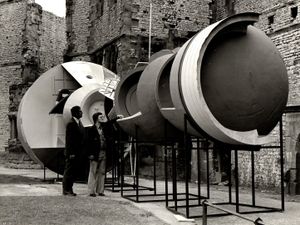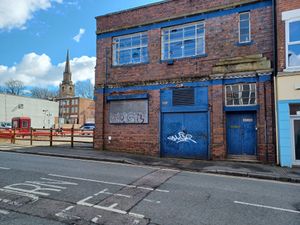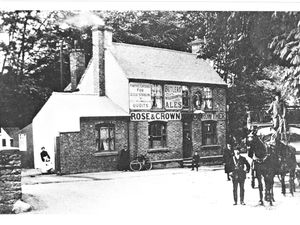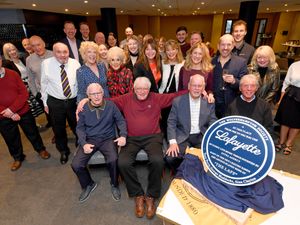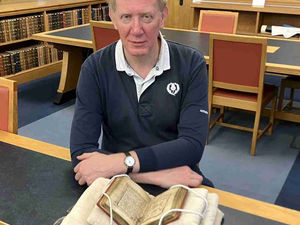Flashback to 1997: Thousands protest against the loss of Kidderminster Hospital's accident and emergency unit
Thousands of people turned out to make their feelings known at a protest against the loss of a hospital's accident and emergency unit.
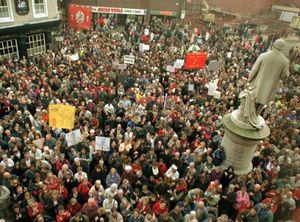
The rally in November 1997 had been sparked by the announcement from Worcestershire Health Authority that they planned to close or downgrade the department at Kidderminster Hospital.
The site served tens of thousands of people across Wyre Forest and south Shropshire.
But health bosses argued that the focus on accident and emergency services should be at a new unit in Worcester.
The plans announced would lead to the loss of over 80 beds at the hospital and would mean patients would have to travel to Worcester, Telford or Shrewsbury for emergency treatment.
The Health Authority was also recommending that up to 60 per cent of the buildings were demolished in favour of a new site in Worcester.
The moves were unanimously condemned by all parties sitting on Wyre Forest Council, which had passed a motion of no confidence n the health authority.
Each political party had also passed their own motion of no confidence on the authority along with the Kidderminster Health Care Trust.
The rally brought out an estimated 5,000 protesters to the Kidderminster Town Hall after a planned march from the hospital.
Over 500 crammed inside the Town Hall to hear speech's from local dignatories.
These included Wyre Forest MP, David Lock, Drr Richard Taylor, Chair of the Kidderminster Hospital League of Friends and Angela Brinton, Chair of Kidderminster Healthcare NHS Trust.
After initial problems with the PA system, the thousands outside got the chance to hear what was said when a couple of megaphones were produced.
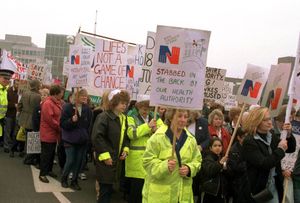
David Lock, MP, said: "The Health Authority can either take notice of this outcry by both the professionals and the public, or they can pretend they know best.
"The Health Authority is a public body which organises public health services with public money. It's about time they took account of the views of the public."
Mr Lock continued that e supported the need for a new hospital in Worcester but not at the expense of the rest of the county.
He said: "The proposals are entirely unnecessary, have not been costed properly and have been condemned by virtually everybody in the county.}
Councillor Chris Nicholls, Chairman of Wyre Forest District Council's Campaign Group said: "We will not rest until we have secured the best possible outcome for our hospital.
"Kidderminster General Hospital has an excellent reputation and is highly regarded across the country. It is simply too good to close."
Mrs Louise Potts, director of Human Resources for Kidderminster Trust said they were overwhelmed by the support of the community.
She said: "This show of force just reinforces the total and absolute opposition to these plans of the Health Authority."
The Kidderminster Healthcare NHS Trust was examining the exact implications of the proposals and with the help of local GP's was drawing up alternatives to the health authority's plans.
Five months later, 12,000 protestors turned out for a Save Our Hospital rally.
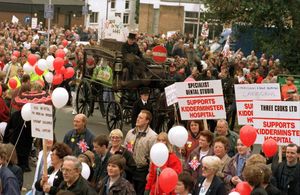
Marching bands and a horse-drawn hearse led the thousands from the hospital to Kidderminster Town Hall with hundreds more lining the route.
A banner on the front of the hearse read The Death of Excellence,an ironic comment on Investing In Excellence, the health authority's restructuring document.
Retired hospital consultant Dr Taylor said that more than 280 individuals and companies had sponsored placard boards and banners and many more had bought their own.
He said: "We want to put as much pressure as we can so that they will know the anger level, and that they have to share these cuts around the country."
Ludlow MP Christopher Gill also spoke out against the downgrading plans concerned about how long it could take patients in south Shropshire to travel to Worcester in an emergency.
"On bank holidays and during the holiday season the roads in and around Bewdley and Stourport are already very congested.
"It is just not practicable to think in terms of ambulances from south Shropshire travelling to Worcester in a time which reflects the urgency of many cases," said Mr Gill.
A 66,000-signature petition was handed in to the health authority.
At the 1999 local council elections, Kidderminster Hospital campaigners won seven seats on Wyre Forest Council and continued to make further gains in the following years.
The new political party, Health Concern also won seats on South Shropshire and Bridgnorth district councils.
In May 2000, Health Concern took control of Wyre Forest District Council, and threatened legal action to prevent the closure.
However, the threat of an injunction sparked an angry reaction from two senior medics at the hospital, who warned that patients could die if campaigners delayed the plans.
In a joint statement, Dr Umesh Udeshi, who had served as consultant radiologist at the Kidderminster hospital for 12 years, and Dr Charles Ashton, said they were dismayed by Wyre Forest Council's announcement that it was taking legal advice on the possibility of an injunction.
"The plans that have been put in place aim wholly at providing safe care for everybody in the county.
"We believe that any delays in actioning the service moves will put patients at risk and could cost lives," they said.
The legal action was dropped, and the A & E unit shut its doors on September 18 that year.
In May 2001, Dr Taylor stood at the General Election as an independent in 2001 fighting on a single issue to restore the hospital's A&E service and won the Wyre Forest seat.

